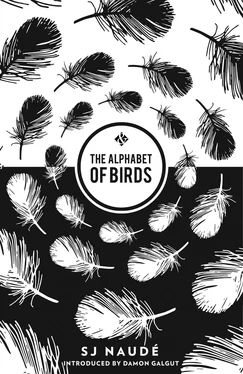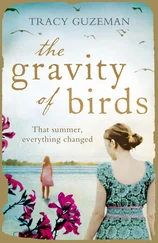The smell of toxic gas enters Sandrien’s nostrils. She walks away without a word, round the back of the classrooms. She will not shed a tear; she won’t. In front of her a furrow has been dug into the hillside, directing water around the building. In the furrow there are two heaps of rubbish. One consists of hundreds of Coke cans, the other of smouldering plastic.
‘I am Walter Mabunda.’
She quickly rubs tears off her cheeks. The man approaches and stands next to her, too close. He takes her hands between his. She stiffens.
‘Why doesn’t someone start a recycling project here?’ she says, her voice more vehement than she intended. ‘It could mean money, jobs.’
‘Perhaps you should do it.’
‘But I’m just here for a few weeks.’
He shrugs his shoulders. ‘Managing this facility is a demanding task. I have only these two hands.’
She loosens hers from his.
‘I presume you’re staying in Bella Gardens?’
She looks at him. A charming voice. In his mid-fifties, she estimates, a good ten years older than she.
‘Yes, at Mrs Nyathi’s.’
‘Hmm, such a good hostess. But,’ he laughs lazily, ‘she governs that establishment with an iron fist, I tell you. The girls who work there, they toe the line. Ooh, very scary,’ he says in an unexpected alto voice, eyes wide. ‘She can be withering,’ he says, ‘blistering.’ He suddenly strikes her as somewhat camp. Below his beer belly, neat folds have been ironed into his slacks. His shoes are shiny.
‘Mrs Nyathi has been a model of courtesy.’
‘By the way, we must ask you not to lure the children.’ His voice is sympathetic, soothing. ‘They are a nuisance. We cannot take on responsibility for the entire community.’
The storms over Vloedspruit are fiercer than anything Sandrien has known. At night, lightning draws nerve patterns across the skies. Fountains burst from the slopes as if through a dam wall. Lower down, small buildings regularly wash away. The government houses remain standing, but mud is building against their walls. She is getting used to the rhythms here, even the storms. Her daily routine is not devoid of minor joys. Mrs Nyathi’s fatty breakfasts, the morning classes at the college, the teas and lunches, the unpredictable — often perplexing — conversations with Mrs Nyathi at night on the veranda. She is getting used to the maids with their quiet eyes, furiously polishing or scurrying down the corridor, possibly instructed to remain invisible to guests. Her fellow students’ social codes remain a mystery, though. As soon as she thinks she has started forming bonds of friendship, she is excluded again.
Sunday afternoons, when the other girls are out and she is not in the mood for Mrs Nyathi’s company, or when the maids’ unseen presences unnerve her, she goes for long walks. She breathes mountain air deep into her lungs after the rain. Children run naked through puddles and mill around her. They tug at her hands or clothes, search her pockets. She hands out money or sweets. She feels embarrassed, like the Western heroine in a Hollywood African fantasy: hand on the little khaki hat, children’s profiles etched against her linen dress. Cows with bony rumps struggle up the slippery slope. One afternoon she realises most of the village market next to the government houses has been washed away.
Wherever she walks, little dogs run after the children and dart around her feet. They yap and yelp, dodging her footsteps.
‘Why are there only small dogs here?’ she asks Mrs Nyathi one afternoon.
Mrs Nyathi holds up her palms, as if saying: Isn’t it obvious? She makes a gesture, as if bringing food to her mouth. ‘They get eaten, don’t they? The big ones.’
She is reluctant to call home. On a Sunday afternoon she calls Brenda, Grace’s daughter, who is looking after Sandrien’s elderly mother. Brenda is sulky.
‘Missus Karlien is walking around with garden shears, trying to cut flies. She refuses to let me change her bedding. Sometimes she eats off the floor.’
The shadow of one of Mrs Nyathi’s maids flits down the corridor. Sandrien regrets making the call, opening the curtain. Once a week Kobus calls from Dorrebult. He talks about his cattle, about their daughters in Bloemfontein. She invokes platitudes, talks about her accommodation, the nursing course, the storms. She keeps it vague. She wants to keep this place — this respite — separate. They do not talk about the illness, about the time she spent in Bloemfontein. That belongs to the past.
When Sandrien encounters Mrs Nyathi in the dim rooms of Bella Gardens, the same ritual always repeats itself.
‘You still enjoying your wonderful stay, Mrs Gouws?’
Without fail, she answers: ‘I am having the most wonderful time in this establishment of yours, Mrs Nyathi.’
Then Mrs Nyathi laughs, nodding her head as if they share a secret.
But this afternoon she catches Mrs Nyathi unawares. When Sandrien enters, she hears a loud voice in the bathroom. A new voice. It is Mrs Nyathi shouting at one of her maids in Xhosa. When Sandrien quietly passes by in the corridor, Mrs Nyathi turns around and smiles. The girl is in the shadow behind her. Sandrien can see the whites of her eyes. Mrs Nyathi pushes the door shut. Silence. From the bathroom, after a while, the unmistakeable sound of a slap.
The other nurses in Bella Gardens are polite, but keep their distance from Sandrien. In the mornings, when they stroll to the college, they cluster together, chattering. Around the table in the evenings the girls and Mrs Nyathi speak a mix of English, Sotho and Xhosa, so that Sandrien only catches the occasional snippet. On weeknights, they mostly retire to their rooms.
On Saturdays, Mrs Nyathi brings someone in to do their hair extensions in the sunshine on the veranda. At dusk there is chit-chat and giggling in the rooms of Bella Gardens. Vapours of perfume drift down the corridor. The maids sneak by on their toes, trying to get a glimpse of all things shiny and fragrant. With jingling bangles they trip through the lounge on silver heels. They make snake-like movements to the beat of inaudible music, initially ignoring Mrs Nyathi, who is looking on and keeping the rhythm. She keeps nodding her approval, over and over again, animated by an infectious exuberance. Then something strange happens: the air starts moving differently around the bodies. As if against their will, the girls start dancing to Mrs Nyathi’s beat. They arrange themselves in relation to her, creating a formation with her at the forefront.
The taxi’s hooter breaks the rhythm. To prevent mud getting on stockings, the driver picks up the girls at the end of the paved garden path. Music flows out when the white taxi door opens. Arms hang out of the windows once they’re inside.
‘Yes,’ says Mrs Nyathi, when they are left sitting alone on the veranda, the village lights and fires below them. Her eyes are moist, searching for the taxi, its music fading amongst the houses. ‘When I was a young nurse, there were also good, good times.’
Tonight she is wearing a headcloth, bright textile from West Africa.
‘Where do they go at night?’ Sandrien wants to know.
‘There are places across the border in Lesotho,’ Mrs Nyathi says, ‘where you can have a lot of fun.’ Her eyes widen and her head nods forward. ‘A lot of fun.’
Mrs Nyathi looks askance at Sandrien, sips her brandy.
‘How about you? You’re still young enough. Don’t you sing and dance, don’t you sometimes seek out a little fun, fun, fun?’ Mrs Nyathi shakes her head, pouting her lips as if talking to a baby.
Sandrien turns her head away, as if interrogating the thickening darkness. She uncrosses her legs, crosses them again. ‘No,’ she says slowly, ‘my body refuses music. I only come close to singing when agony is at its worst. Then I make small noises under my breath. When I was ill, I sang like that, if you can call it singing.’
Читать дальше












